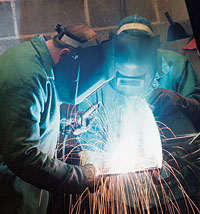
In the eyes of Mark McCarty, health care isn't the only field where one needs to look for "superior training and value." The business manager for United Association (UA) Local Union 178 in Springfield, Mo., believes taking the low bid on a project in the name of saving money can be a risky venture in the construction industry, too.
"More often that not, the lowest bidder uses a workforce with limited educational criteria and insufficient safety training," said McCarty. "Also, the lowest bidder may not warranty the work or return to the project to fix problems - if they are still in the area."
To combat this situation, Local 178 joined forces with 14 local unions to form MINK (Missouri, Iowa, Nebraska, Kansas) Pipe Trades, which comprises a workforce of plumbers, pipefitters, and HVACR technicians. "Many times, building owners have had to use our workers to correct mistakes made by low-bid contractors whose installations worked poorly," said McCarty. "That means they had to pay for the same job twice - an expense they could have avoided by selecting the most experienced workers the first time."
The 9,000-plus skilled MINK craftspeople never stop learning, according to Rich Taylor, business manager for UA Local Union 441 in Wichita, Kan. They receive training at 14 centers throughout the MINK Pipe Trades states. They begin learning their skills in five-year apprenticeship programs, where each receives 2,000 hours of training annually, in the classroom and on the job. The MINK Pipe Trades has more than 1,500 apprentices in training, and the organization graduates almost 350 students a year.
"Even after they enter the workforce, our workers receive opportunities for continuing education," said Ray Dochterman, business manager for UA Local Union 125 in Cedar Rapids, Iowa. "Each year more than 4,100 MINK journeymen pursue additional training and receive a combined total of 67,500 hours of continuing education."
Taylor asserts that safety and productivity are often compromised in the low-bid construction delivery process. He pointed to statistics from the Occupational Safety and Health Administration (OSHA), which showed that from January 2002 to June 2004, nonunion mechanical contractors in Missouri, Iowa, Nebraska, and Kansas were cited for twice as many safety violations as MINK union contractors and their workforce. He noted that MINK craftspeople receive an average of 10 hours of OSHA training.
According to Dochterman, MINK local unions spend a total of $7.6 million annually in training.
"It is always worth the investment to receive end results you can live with," said McCarty. "That's why we work to educate owners, construction managers, and public officials on the cost-effectiveness of a well-trained workforce."
For more information, visit www.minkproof.com.
Publication date: 05/30/2005

Report Abusive Comment